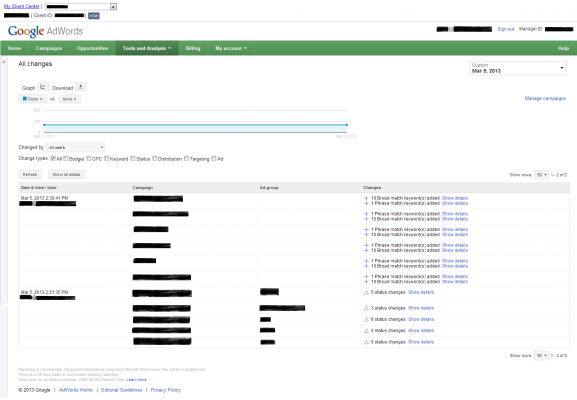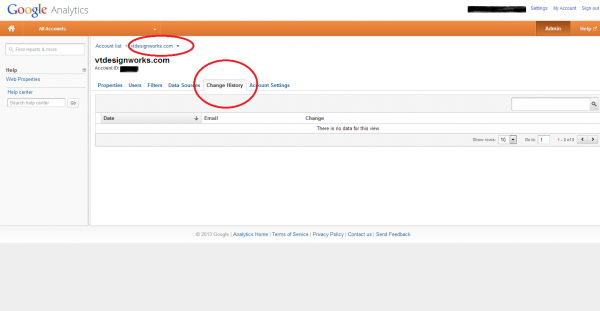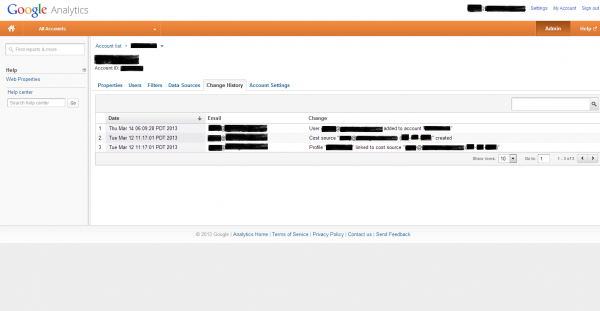Summary: Google Analytics recently added a feature that has been available to Google Adwords users for some time - "Change History". Now, when any type of account changes are made they'll be logged in this area for future reference. From new users added and filters applied to Adwords linking and goal setup, Analytics now keeps a record of all important account changes.
In the web development industry, it's not uncommon to see small changes to one aspect of a website have dramatic and negative unintended consequences. Even a single errant character in the code can bring down an entire page. The same applies to digital advertising (adding an extra zero to a budget, etc.) and really any other part of the "online world" so many of us reside in today. It's just a fact - $#!+ happens. But when it does, wouldn't it be nice if you knew right away who was responsible? Even if the error isn't worthy of punishment, it's certainly helpful for everyone to learn from their mistakes. The trouble has been that at any given time there are any number of cooks sharing equipment in the same kitchen, so when someone breaks the mixer, it's not been possible to tell who it was and hold them responsible. Fortunately Google is attempting to remedy that situation, at least for users of some of their most popular products.
Google Adwords Change History - An Indispensable Tool
Online advertisers have long treasured the "
Change History" feature of Google Adwords because it helps us tell when certain changes were made so we can accurately track account performance over specific periods of time, allowing us to make more informed decisions when optimizing campaigns. For example, we can see when keywords were added, bids or budgets increased, etc., then review if and how account performance changed since the adjustments were made and use that information to influence our future decisions.
Multiple Adwords User Change History
The benefits realized by the average Adwords advertiser are summarized above, but for web firms like ours, the even greater benefit is seeing
who exactly made a change, in the event there is a problem. For example, many clients come to us with existing campaigns that have been mismanaged, either by other firms or by the business owners themselves. Because these accounts already exist, we're added as Client Managers to the accounts, but the business owner and often several other employees remain admins. If one of these other admins logs in and makes a change without telling us and that change leads to adverse effects for the business, the Adwords Change History can stop any finger-pointing that might ensue dead in its tracks. This actually once helped us track down a client who's account had been hacked. There were wild and unexplained changes to the way an account was performing, out of the blue, and we never even had to wonder if something slipped through the cracks on our end because we could see which account had made recent changes. After a couple of calls with our clients and Adwords support it was easily determined that the client's account had been hacked and they needed to change their login info (and get some internet security software installed!). Fortunately in this case the changes had also been so dramatic that Google flagged the issue and paused the campaigns and our client wasn't charged.
Take a look at the screenshot below for an idea of level of detail offered in Adwords change history reports:

Too keep the screenshot reasonably small, I selected only a single date, but it still serves as great example. At the top of the list are multiple instances of me adding 10 broad match keywords and 1 phrase match keyword to a half dozen different campaigns - these were actually negative keywords we added after past performance and client review. You can even click on "Show Details" next to any item and actually see a list of the keywords which is incredible amount of detail. Below those items are 5 "status changes" to individual ad groups (activating some, pausing others - seasonal changes). And just as important as the specific change information and the expandable "details" is the "Date & time / User" column, which shows precisely down to the second when each change was made and by whom. You can also see in the screenshot that you're able to filter to only show certain types of changes which can be helpful if you make a lot of changes.
Google Analytics Change History Launched
Seeing how beneficial the change history feature has been for Adwords users, Google recently decided to add the feature to
Analytics accounts. For several weeks I've actually seen a "coming soon" notification whenever I logged into GA, but when I clicked the link it took me to that page that made it sound like the feature had already rolled out, which it clearly hadn't (at least not for me), however it has now. Basically you just have to go to the "Admin" area within any individual account and then click the account name in the breadcrumb navigation (After "Account list"), then click the "Change History" tab. I've circled these two areas in the screenshot below:

Now, clearly there aren't any changes to report in the change history for Vermont Design Works, but here's
what Google says you will be able to see in this new tab and why it's helpful:
The Change History lists:
- Date column: The date and time of the activity
- Email column: Which Analytics user performed the activity
- Activity column: The Analytics object (e.g., account, user, profile, goal, filter), and what activity was performed on the object (e.g., added to account, created, deleted)
With this information in hand, you can investigate things like who added filters to my default profile, when were those new users added to the account, or who deleted the regex include filter I spent all week writing? Rather than wonder if something just mysteriously changed or disappeared, you can open Change History to see exactly what happened when, and who was responsible.
In order to provide you with at least one example, I dug around in some client accounts before remembering that I recently connected a client's Adwords account to their Analytics account for them and then added another admin user.

Seeing as the Analytics code being placed correctly on all pages of the website is what impacts the traffic data flow to the visual GA interface, most of these changes that will be tracked in the new change history tab aren't a major concern in the sense that they won't cost you money (ad budgets) and won't break your website, but you can certainly see how the information could be useful.
What do you think about the new Analytics Change History feature? How do you intend to use it? Let us know in the comments below if you are having trouble accessing it or if you have any other questions about Google Analytics.
 Too keep the screenshot reasonably small, I selected only a single date, but it still serves as great example. At the top of the list are multiple instances of me adding 10 broad match keywords and 1 phrase match keyword to a half dozen different campaigns - these were actually negative keywords we added after past performance and client review. You can even click on "Show Details" next to any item and actually see a list of the keywords which is incredible amount of detail. Below those items are 5 "status changes" to individual ad groups (activating some, pausing others - seasonal changes). And just as important as the specific change information and the expandable "details" is the "Date & time / User" column, which shows precisely down to the second when each change was made and by whom. You can also see in the screenshot that you're able to filter to only show certain types of changes which can be helpful if you make a lot of changes.
Too keep the screenshot reasonably small, I selected only a single date, but it still serves as great example. At the top of the list are multiple instances of me adding 10 broad match keywords and 1 phrase match keyword to a half dozen different campaigns - these were actually negative keywords we added after past performance and client review. You can even click on "Show Details" next to any item and actually see a list of the keywords which is incredible amount of detail. Below those items are 5 "status changes" to individual ad groups (activating some, pausing others - seasonal changes). And just as important as the specific change information and the expandable "details" is the "Date & time / User" column, which shows precisely down to the second when each change was made and by whom. You can also see in the screenshot that you're able to filter to only show certain types of changes which can be helpful if you make a lot of changes.
 Now, clearly there aren't any changes to report in the change history for Vermont Design Works, but here's what Google says you will be able to see in this new tab and why it's helpful:
Now, clearly there aren't any changes to report in the change history for Vermont Design Works, but here's what Google says you will be able to see in this new tab and why it's helpful:
 Seeing as the Analytics code being placed correctly on all pages of the website is what impacts the traffic data flow to the visual GA interface, most of these changes that will be tracked in the new change history tab aren't a major concern in the sense that they won't cost you money (ad budgets) and won't break your website, but you can certainly see how the information could be useful.
What do you think about the new Analytics Change History feature? How do you intend to use it? Let us know in the comments below if you are having trouble accessing it or if you have any other questions about Google Analytics.
Seeing as the Analytics code being placed correctly on all pages of the website is what impacts the traffic data flow to the visual GA interface, most of these changes that will be tracked in the new change history tab aren't a major concern in the sense that they won't cost you money (ad budgets) and won't break your website, but you can certainly see how the information could be useful.
What do you think about the new Analytics Change History feature? How do you intend to use it? Let us know in the comments below if you are having trouble accessing it or if you have any other questions about Google Analytics.
